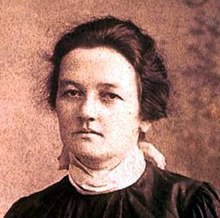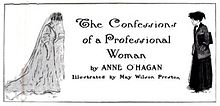Anne O'Hagan Shinn
Anne O'Hagan | |
|---|---|
 c.1898 | |
| Born | August 8, 1869 Washington, D.C. |
| Died | June 24, 1933 (aged 63) New York City |
| Occupation | Writer |
| Nationality | American |
| Alma mater | Boston University |
Anne O'Hagan Shinn (August 8, 1869 – June 24, 1933) was an American feminist, suffragist, journalist, and writer of short stories, regularly contributing to publications such as Vanity Fair, and Harper's. In particular, she is known for her writings detailing the exploitation of young women working as shop clerks in early 20th Century America.
Early life and education
[edit]Anne O'Hagan was born in Washington, D. C. in 1869, daughter of Captain John O'Hagan and Mary Fennell O'Hagan. She graduated from Boston University in 1890.[1][2]
Career
[edit]
O'Hagan was a member of Heterodoxy, a feminist debating club based in Greenwich Village and she was a founding officer of the Women's Democratic Union.[4] She served on the board of the Equal Suffrage League of New York, and the Women's Suffrage Study Club, among other New York suffrage organizations.[5] She also supported the reform of prohibition laws.[6][7][8] O'Hagan was a member of the Protestant Church of St. Luke in the Fields in Greenwich Village at the same time as Eleanor Roosevelt.[9]

As a journalist, O'Hagan was a regular contributor to Vanity Fair, Harper's, Munsey's, Collier's, and other popular periodicals, often writing on feminist topics.[10][11] For example, an article for Munsey's magazine in 1901 titled "The Athletic Girl," celebrated the entry of women and girls into active recreation, for their long-term health as well as for their release from restrictive clothing and passive pursuits.[12] O'Hagan discusses the differing roles of the spinster and the married woman and how women can choose to be celibate and have mature conversations with single men.[13]
Of particular interest to her was the exploitation of young women shop clerks.[14][15][16][17] After suffrage, Shinn covered American politics for The New York Times, including a long interview with the future presidential candidate Alfred E. Smith in 1922.[18]
O'Hagan participated in several collaborative fiction projects, where multiple authors would write chapters of a novel or series, including The Good Family series in Harper's Magazine (1907), and The Sturdy Oak serialized political novel in Collier's Magazine (1917).[19] O'Hagan was also a prolific writer of short fiction.[20]
Personal life and legacy
[edit]Anne O'Hagan is thought to have lived with her mother until she married Francis Adin Shinn in 1908. She is thought to have written an anonymous article that described the problems of a modern single woman who lived with her old-fashioned mother.[13] She died in June 1933, age 63, after a brief illness, in New York City.[1] Her funeral was held in Litchfield, Connecticut, where she had a country home.[21] The O'Hagan Shinn Scholarship Fund at Boston University was established in 1936 in her memory, for scholarships in English literature.[22]
References
[edit]- ^ a b "Mrs. F. A. Shinn, Writer, Dies at 63," The New York Times (June 25, 1933): 22.
- ^ "Christmas Reunion of Epsilon Chapter," Bostonia 10–11(1909): 21.
- ^ SIMKHOVITCH, MARY KINGSBURY (1938). Neighborhood; my story of Greenwich House. New York, Norton. p. 57.
- ^ "Anti-Hearst Women Prepare Campaign," The New York Times (June 2, 1922): 24.
- ^ John William Leonard, ed., Woman's Who's Who of America (American Commonwealth Company 1914): 742.
- ^ "Women Democrats Ask Dry Law Views," The New York Times (May 15, 1928): 4.
- ^ "155 in the Arts Join Anti-Dry Body," The New York Times March 17, 1930): 23.
- ^ "Women Wet Leaders Endorse Roosevelt," The New York Times (July 8, 1932): 1.
- ^ The New York Anglicans: Twenty Who Shaped the Twentieth Century, Anglican Examiner, retrieved 16 March 2015
- ^ Pendennis, "Anne O'Hagan Writes Stories on Business Principles," The New York Times (June 18, 1905): SM3.
- ^ Alice Fahs, Out on Assignment: Newspaper Women and the Making of Modern Public Space (University of North Carolina Press 2011): 32–33. ISBN 0807834963
- ^ Douglas A. Noverr and Lawrence Ziewacz, The Games They Played: Sports in American History, 1865–1980 (Rowman & Littlefield 1983): 11–12. ISBN 0882298194
- ^ a b Howard, June (2001). Publishing the family. Durham: Duke Univ. Press. pp. 201, 298 et al. ISBN 0822327716.
- ^ Anne O'Hagan, "The Shop Girl and Her Wages," Munsey's Magazine 50(November 1913): 252–259.
- ^ Sally Barr Ebest, The Banshees: A Literary History of Irish American Women Writers (Syracuse University Press 2013): 26-27. ISBN 978-0-8156-3330-3
- ^ Anne O'Hagan, "Behind the Scenes in the Big Stores," Munsey's Magazine 22(4)(January 1900): 533-535.
- ^ Louisa Iarocci, The Urban Department Store in America, 1850–1930 (Ashgate Publishing 2014): 107–108. ISBN 140944743X
- ^ Anne O'Hagan Shinn, "Alfred E. Smith: A Personal Impression," The New York Times (October 22, 1922): 67.
- ^ Elizabeth Jordan, ed. The Sturdy Oak: A Composite Novel of American Politics by Fourteen American Authors (1917).
- ^ Charles Fanning, The Irish Voice in America: 250 Years of Irish-American Fiction (University Press of Kentucky 2015): 183. ISBN 0813109701
- ^ "Final Rites Scheduled Today for Mrs. F. A. Shinn," Brooklyn Daily Eagle (June 26, 1933): 13. via Newspapers.com
 .
.
- ^ Report of the President, Boston University (1941): 210.
External links
[edit] Works by or about Anne O'Hagan Shinn at Wikisource
Works by or about Anne O'Hagan Shinn at Wikisource Media related to Anne O'Hagan Shinn at Wikimedia Commons
Media related to Anne O'Hagan Shinn at Wikimedia Commons
